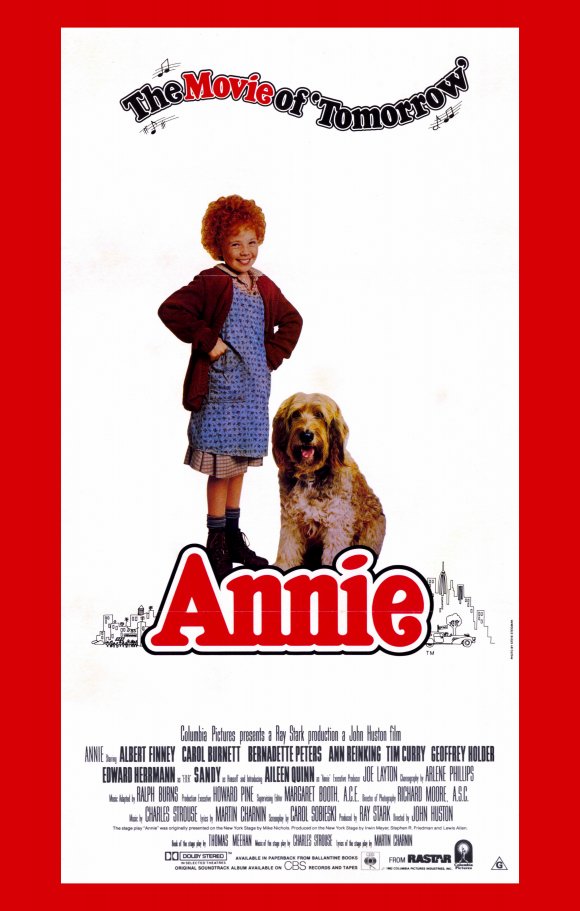Stage to Screen - The Original Annie Film
With all of the talk about the revised and updated film version of Annie set to be released on December 19th, 2014, it prompted me to start thinking about the original 1982 film adaptation that I grew up watching. It is true that this version is misguided by director John Huston and the adaptation from stage to screen does nothing to lessen the amount of sugary optimism that comes at you like a molasses enema. I still, however, have a fondness for portions of the film, especially the deliciously droll comedic turns from Carol Burnett, Bernadette Peters, and Tim Curry. As reviews for the new, updated Annie putrefy the air with their stark honesty, I like to muse over the 1982 film and examine what worked and what did not.
Questions arise from minute go when we examine the size of the orphanage in the film version. There are at least 100 moppets spunkily prancing their way through the establishment. Miss Hannigan (Burnett) is the only person on staff to oversee the Cecil B. de Mille dramatis personae; it is no wonder the woman drinks. I'd buy her the hooch myself. Burnett, however, makes the overwhelmed lush both delightfully wicked and hysterically sardonic so that you revel in very interaction she has with Annie and chirpy posse. When Hannigan's criminally kooky brother Rooster (Curry) and his dimwitted bimbo girlfriend Lily St. Regis (Peters) enter there is enough comedic power amongst our villains to save the film, no matter how painful the rest of it is.
Ann Reinking and Aileen Quinn in Annie.
Aileen Quinn, as the optimistic orphan Annie, seems as if she has been put through some sort of cult conditioning, programmed to radiate the constant sunshine that is apparently coming out tomorrow, but that is burning us to a crisp today. Each smile, nod, and chin-up gesture feels so extraneously fabricated by writers, director and whoever else was responsible, it is impossible to blame this little girl for her lack of spontaneity or character subtlety. Albert Finney as the millionaire Oliver Warbucks seems to be under the same set of generalized emotional constraints, but in this case the directive is "be stridently crusty." He is not an awful Warbucks, but stripped of some of Warbuck's best numbers "NYC" and "Something Was Missing," he is reduced to caricature and never really given a chance to evolve. I love Ann Reinking; god knows I think she is a talented dancer, but I want to know who read the script, looked at the character of Grace Farrell, and decided that Ms. Reinking was the answer to this casting choice? Even as she tries to be demure, we find her flipping up her skirt and sexily dancing to and singing "We've Got Annie." It's enough to make anyone uncomfortable. Only the mystical Punjab (played by the recently passed and always memorable Geoffrey Holder) brings any joy to the Warbucks' household.
The film excises a larger portion of the stage score, very often to its detriment. It seems to me that any song that gave the story a balance, songs that offset powerhouse ballads of optimism with a gentle subtlety, were cast aside. Along with the aforementioned Warbuck's numbers, the loss of "We'd Like to Thank You, Herbert Hoover," took any social bite and historical commentary out of the film, and the discarding of "A New Deal for Christmas" negates an opportunity for sincere optimism and hope. What the first film version of Annie is lacking, and what is the only thing that anchors the stage show from drifting into Candy Land, is the true understanding and interpretation of the Great Depression and the financial state of ruin our country was in in the 1930s.. The stage production had "We'd Like to Thank You, Herbert Hoover," an acidic comic number for a chorus of shantytown residents that Annie happens upon when she runs away from the orphanage. They ruminate over the failed promises of the titular president that led them to economic hardship and essentially, homelessness. It was a pointed indictment of Hoover's "Trickle Down Theory" that put money in the pockets of the rich in an effort to see it trickle down to the poor. Not only didn't this plan work, but it made things worse. The song sets up, with some integrity, Annie's need to appeal to President Roosevelt for help on the behalf of the country, which eventually leads to his "New Deal" plan. Excising this song from the film version just made Annie into a cloying moppet who slops sugar all over the president. The stage production of Annie has a much stronger tie to history and politics that gives the piece purpose and much-needed gravitas.
The new songs are pale comparisons to their stage counterparts and only the droll "Sign" for Warbucks and Miss Hannigan sort of works, but even that feels sadly out of place here.
Carol Burnett in Annie.
I have no interest in seeing the new film version of Annie and the more I hear about it, the more mortified I am that those who own the property allowed this to be done to their baby. Considering, however, what they allowed to be done to it in 1982, I should not be surprised that the material is not better guarded by the hands that crafted it. I will, however, always have a fondness for portions of that 1982 endeavor and that is thanks mostly to Burnett, Curry and Peters.








